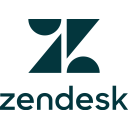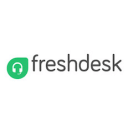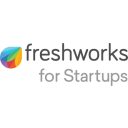Salesforce Service Cloud vs Zendesk: Choosing the right customer support solution
- 01Salesforce Service Cloud vs Zendesk: overview
- 02What's the difference between Salesforce Service Cloud and Zendesk?
- 03Salesforce Service Cloud pros and cons
- 04Zendesk pros and cons
- 05Salesforce Service Cloud compared to Zendesk
- 06Zendesk compared to Salesforce Service Cloud
- 07Features comparison
- 08Salesforce Service Cloud vs Zendesk: Which is the best for your business?
- 09Promotions on Customer Support software
- 10Alternatives to Salesforce Service Cloud & Zendesk
Save up to $50,000 on Zendesk
Save up to $50,000 on Zendesk
When it comes to customer service and support software, Salesforce Service Cloud and Zendesk are two major contenders, each excelling in its own category. Navigating this choice is pivotal for businesses seeking efficient customer interaction management and support.
In this comparison, we will thoroughly analyze Salesforce Service Cloud vs Zendesk, delving into their respective categories. We'll explore their core features, pricing models, and customer service offerings. By the end of this evaluation, you'll have a comprehensive understanding of which platform, whether you prioritize comprehensive CRM solutions with Salesforce Service Cloud or streamlined customer support with Zendesk, best suits your business needs. Regardless of your company's size, selecting the right software is paramount for delivering exceptional customer experiences and sustaining business growth.
Salesforce Service Cloud vs Zendesk: overview
Salesforce Service Cloud and Zendesk are two prominent contenders in the realm of customer service and support software, each tailored to distinct user demands.
Zendesk is celebrated for its user-friendly approach, designed to simplify customer interactions and support processes. It's an excellent choice for businesses seeking efficient ticketing, knowledge base management, and customer engagement. In contrast, Salesforce Service Cloud offers a comprehensive suite of customer service, sales, and marketing tools suitable for organizations of all sizes. It boasts extensive features, including customizable workflows, artificial intelligence-driven insights, and seamless third-party integrations.
In this Salesforce Service Cloud vs. Zendesk comparison, we will explore the intricacies of each platform, aiding you in making an informed decision about the right customer service and support solution for your unique business needs. Whether you prioritize simplicity or require advanced functionalities, this comparison will guide you towards the software that aligns best with your specific requirements.
What's the difference between Salesforce Service Cloud and Zendesk?


Zendesk is a software platform that aids in the management of customer issues. It allows users to consolidate all customer interactions into one central location, facilitating a seamless, personalized, and efficient support experience. Service Cloud, on the other hand, is a customer service solution offered on the Salesforce Platform. It provides a comprehensive and holistic view of customer inquiries, enabling intelligent, speedy, and tailored communication. Service Cloud includes features that automate processes, streamline workflows, and organize self-service resources.
Service Cloud doesn’t have a ticketing service; instead, they call it “cases,” and they utilize AI routing to allow you to assign cases to agents that are best equipped to solve that particular ticket. Multi-channel support comes as standard, including email, chat, phone, and social networks. Furthermore, Service Cloud offers a Lightning Community Builder that helps companies create customized brand portals or communities around the internal knowledge base. With the Service Cloud solution, companies can take full advantage of the Salesforce ecosystem and easily integrate with other offers.
Zendesk, on the other hand, offers full management of the ticket workflow system while complementing it with various email templates, scheduling features, and manual choice of ticket agents. There are also automation ticket triggers that can be set up, but not as complex as what Salesforce offers. Similarly to its competitors, Zendesk offers multichannel support across email, chat, phone, and social networks. Zendesk offers companies the ability to create a smart knowledge base, with functionalities extended if you go for the Professional or Enterprise plans. A stand-out feature that Zendesk offers out of the box that Service Cloud does not is the ability to survey customers about satisfaction. Moreover, Zendesk offers you the ability to extend its functionality with the help of over 660 apps and advanced reporting features from the Zendesk marketplace.
In conclusion, the decision of which platform to choose will depend on the needs of your company as well as the budget you’re willing to spend on creating the best possible customer support experience.
6 months free on Zendesk
Get 6 months free on Zendesk and up to $50,000 savings with Secret.
Salesforce Service Cloud pros and cons
What are the advantages of Salesforce Service Cloud?
- Comprehensive CRM: Service Cloud offers a wide range of customer relationship management (CRM) features, including customer support, sales automation, and marketing capabilities, all integrated into one platform.
- Scalability: It caters to businesses of all sizes, from small startups to large enterprises, making it versatile and adaptable to your company's growth.
- Customization: Service Cloud allows for extensive customization, enabling businesses to tailor workflows, processes, and user interfaces to match their specific needs.
- Automation: The platform offers robust automation tools that help streamline and optimize various tasks, increasing efficiency and reducing manual work.
- Analytics and reporting: Service Cloud provides advanced reporting and analytics capabilities, allowing you to gain valuable insights into customer interactions and service performance.
What are the disadvantages of Salesforce Service Cloud?
- Cost: Service Cloud can be expensive, particularly for smaller businesses, as it requires ongoing subscription fees and additional costs for customization and add-ons.
- Complexity: The platform's extensive features can be overwhelming for users, and it may require comprehensive training to use it effectively.
- Integration challenges: While it offers a wide range of integrations, integrating Service Cloud with certain third-party applications can be complex and costly.
- Steeper learning curve: Learning to navigate and fully utilize the platform's capabilities may take time, especially for new users.
- Limited offline access: Some features may not be accessible offline, which can be a limitation for users who require constant connectivity.
Zendesk pros and cons
What are the advantages of Zendesk?
- User-friendly interface: Zendesk is known for its intuitive and user-friendly interface, making it easy for agents and customers to navigate and use.
- Ticketing system: The platform offers a robust ticketing system that consolidates support requests from various channels into organized tickets, improving efficiency and tracking.
- Customization and branding: Zendesk provides extensive customization options, allowing businesses to tailor the platform to match their branding and design preferences.
- Knowledge base: Zendesk's knowledge base feature enables the creation and maintenance of articles, FAQs, and self-help resources, empowering customers to find answers independently.
- Cost-effective: Zendesk offers pricing tiers suitable for small to mid-sized businesses, making it a cost-effective solution for customer support.
What are the disadvantages of Zendesk?
- Limited CRM features: Compared to some other platforms, Zendesk's CRM capabilities may be less comprehensive, particularly for sales and marketing functionalities.
- Complexity for advanced needs: Businesses with complex workflows or extensive automation requirements may find that Zendesk lacks certain advanced features.
- Integration challenges: While it offers various integrations, connecting Zendesk with specific third-party applications may require extra effort and customization.
- Reporting limitations: Zendesk's reporting and analytics capabilities, while sufficient for many businesses, may not be as robust as some competitors.
- Limited offline access: Some features may not be accessible offline, which could be a limitation for users who require constant connectivity.
Compare Zendesk to other tools
Salesforce Service Cloud compared to Zendesk
Salesforce Service Cloud and Zendesk are leading customer service and support management solutions, each with its own strengths. Salesforce Service Cloud, part of the broader Salesforce ecosystem, offers extensive customization, scalability, and integration capabilities. It excels in managing complex customer service processes for large enterprises.
In contrast, Zendesk is known for its user-friendly interface and multichannel support, making it accessible to businesses of all sizes. While Salesforce Service Cloud provides powerful analytics and AI features, Zendesk offers a more straightforward pricing structure.
Is Salesforce Service Cloud better than Zendesk?
Whether Salesforce Service Cloud is better than Zendesk depends on your organization's unique needs and priorities. Salesforce Service Cloud is a robust, highly customizable solution suitable for larger enterprises, offering extensive integration capabilities within the Salesforce ecosystem. It excels in complex customer service processes and analytics. In contrast, Zendesk provides a user-friendly interface and multichannel support, making it accessible to businesses of all sizes. Zendesk offers a more straightforward pricing structure but may have limitations in customization.
To determine which is better, consider factors like scalability, customization requirements, and budget, ensuring the platform aligns with your specific customer service objectives.
What is Salesforce Service Cloud best used for?
Salesforce Service Cloud is best used for streamlining and enhancing customer service and support operations. It excels in managing customer interactions, resolving issues, and ensuring a seamless customer experience. With its robust features, it's ideal for large enterprises with complex service processes, enabling efficient case management, knowledge base creation, and automation.
Service Cloud also offers powerful analytics and AI capabilities to gain insights and improve service quality. Moreover, it's highly customizable and integrates seamlessly with other Salesforce products and third-party applications, making it versatile for various industries and customer support scenarios, including call centers, help desks, and field service management.
Can Salesforce Service Cloud replace Zendesk?
Salesforce Service Cloud and Zendesk are both popular customer service and support software solutions, but they serve slightly different purposes and have different strengths. Whether Salesforce Service Cloud can replace Zendesk depends on your specific needs and requirements.
Salesforce Service Cloud is part of the broader Salesforce ecosystem, which includes CRM (Customer Relationship Management) capabilities. If you are already using Salesforce for sales and marketing, integrating Service Cloud may be more seamless. It is known for its scalability and is often chosen by larger enterprises with complex customer service operations. In contrast, Zendesk is a standalone customer support solution, which can also be integrated with other software, but it doesn't come with the extensive CRM features that Salesforce offers. It is used by businesses of all sizes, but it's particularly popular among smaller and mid-sized companies.
Salesforce Service Cloud can potentially replace Zendesk, but it depends on your organization's size, existing technology stack, budget, and specific customer service requirements. Before making a decision, it's essential to evaluate both platforms thoroughly, consider your long-term goals, and potentially consult with your IT or CRM experts to determine which solution best fits your needs.
Is Salesforce Service Cloud cheaper than Zendesk?
Salesforce Service Cloud and Zendesk are two popular customer service software options, each with its own pricing structure. Determining which one is cheaper depends on your specific needs and usage. Salesforce Service Cloud’s pricing tends to be more expensive, primarily aimed at larger enterprises with complex requirements.
Zendesk, on the other hand, offers various pricing tiers, including more budget-friendly options for smaller businesses. It's essential to consider factors like the size of your team, desired features, and scalability when comparing costs. Conduct a thorough evaluation of both platforms to determine which aligns better with your organization's budget and requirements.
Is there a better Customer Support software than Salesforce Service Cloud?
Selecting the ideal customer service software is crucial, demanding a careful evaluation of your distinct needs and goals. Is There a Better Software Than Salesforce Service Cloud? is a pertinent question.
While Salesforce Service Cloud boasts extensive features and integration capabilities, it's worth exploring alternative options. Zendesk, Freshdesk, and Zoho Desk, for instance, offer competitive solutions for customer support and engagement. Each platform brings unique strengths to the table, from ticket management to knowledge base functionality. The choice depends on your company's size, specific requirements, and budget considerations.
Zendesk compared to Salesforce Service Cloud
Zendesk and Salesforce Service Cloud are leading customer service software platforms. Zendesk is known for its user-friendly interface and strong ticketing system, making it an excellent choice for small to mid-sized businesses.
Salesforce Service Cloud, on the other hand, offers extensive features, making it suitable for larger enterprises with complex needs. While Zendesk focuses on customer support, Salesforce Service Cloud provides a broader suite of tools, including sales and marketing capabilities. The choice between them depends on your company's size, industry, and specific requirements. Consider your organization's goals and resources when deciding which platform aligns best with your needs.
Is Zendesk better than Salesforce Service Cloud?
Determining whether Zendesk is better than Salesforce Service Cloud depends on your organization's specific needs. Zendesk excels in providing a user-friendly interface and robust ticketing system, making it an attractive option for smaller to mid-sized businesses seeking efficient customer support solutions.
On the other hand, Salesforce Service Cloud offers a comprehensive suite of tools tailored to larger enterprises with complex requirements, encompassing not only customer service but also sales and marketing capabilities. The choice between them hinges on factors like your company's size, industry, and the extent of functionalities required. Assess your unique needs and resources to determine which platform aligns better with your objectives.
What is Zendesk best used for?
Zendesk is primarily used for managing customer support and service operations. It excels in streamlining customer interactions through its ticketing system, allowing businesses to efficiently handle customer inquiries, complaints, and requests.
Zendesk offers a user-friendly interface and customizable workflows, making it ideal for organizations of various sizes, from small businesses to large enterprises. It enables companies to provide timely responses, track customer issues, and maintain a comprehensive knowledge base. Additionally, Zendesk offers reporting and analytics tools to assess customer service performance and improve overall customer satisfaction. Overall, Zendesk is best used for enhancing and optimizing customer support and service management processes.
Can Zendesk replace Salesforce Service Cloud?
Zendesk and Salesforce Service Cloud serve similar purposes in providing customer service and support solutions, but whether Zendesk can replace Salesforce Service Cloud depends on your organization's specific needs and requirements.
Zendesk is primarily a customer service and support platform and does not offer the same level of CRM functionality as Salesforce. It is often praised for its user-friendly interface and ease of use. Zendesk may provide a more cost-effective option for organizations with straightforward customer support needs. In contrast, Salesforce Service Cloud may offer more extensive features and customization options, especially in terms of leveraging CRM capabilities for sales and marketing. It is part of the broader Salesforce ecosystem, which includes CRM (Customer Relationship Management) capabilities.
Zendesk has the potential to replace Salesforce Service Cloud, but this depends on factors such as your organization's size, existing technology infrastructure, budget constraints, and the specific depth of customer service and CRM functionality you require. Before making a decision, it's crucial to thoroughly evaluate both platforms, consider your long-term objectives, and possibly seek advice from IT or CRM experts to determine which solution aligns best with your needs and goals.
Is Zendesk cheaper than Salesforce Service Cloud?
Determining whether Zendesk is cheaper than Salesforce Service Cloud depends on your specific needs and the scale of your business. Zendesk’s pricing typically offers more budget-friendly options, making it appealing to smaller companies and startups. Its pricing plans are often straightforward and suitable for organizations with limited resources.
Salesforce Service Cloud, on the other hand, tends to be more expensive, particularly designed for larger enterprises with complex requirements. The cost disparity is due to the comprehensive suite of features and broader capabilities it provides. To make an informed decision, assess your business size, needs, and available budget when comparing the costs of Zendesk and Salesforce Service Cloud.
Is there a better AI Customer Support software than Zendesk?
Selecting the right customer service software demands a thoughtful assessment of your organization's specific requirements and objectives. The question of whether there's better software than Zendesk is crucial.
While Zendesk is renowned for its customer support capabilities, it's important to explore alternative options like Freshdesk, Zoho Desk, and Salesforce Service Cloud. Each platform offers distinct strengths, from ticket management to comprehensive CRM functionalities. Your choice should hinge on factors such as your business size, industry, and specific customer service needs. By carefully evaluating these alternatives, you can determine whether there's software better suited to enhance your customer support operations and meet your unique goals.
6 months free on Zendesk
Get 6 months free on Zendesk and up to $50,000 savings with Secret.
Features comparison
Salesforce Service Cloud Leads in Field Service Management with a Focus on Mobility
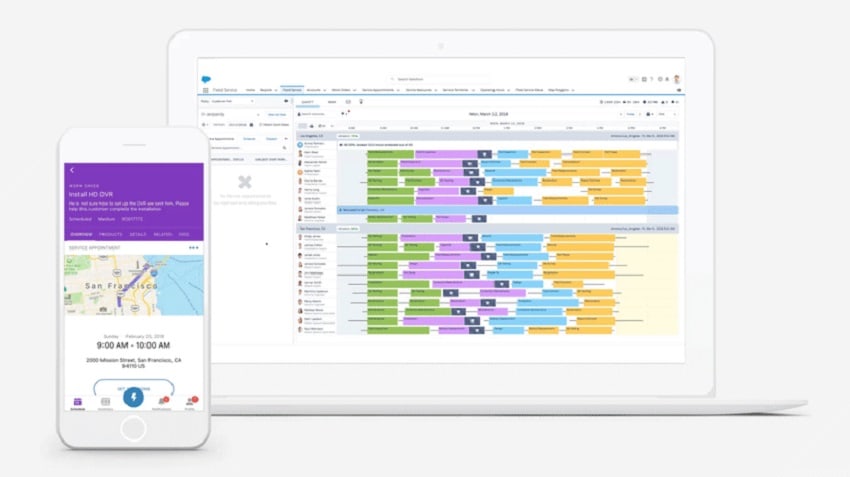
In the realm of field service management, Salesforce Service Cloud shines with its emphasis on mobility and remote issue resolution. This feature stands out by efficiently troubleshooting problems from a distance, reducing the necessity for onsite visits. It equips the mobile workforce with essential tools and real-time connections, enabling quick issue resolution and significantly boosting first-time fix rates. This capability ensures that customers receive exemplary service, regardless of their location.
In contrast, Zendesk lacks specific features tailored to field service management. While Zendesk excels in other customer service areas, it may require third-party integrations or additional customization to match Salesforce Service Cloud's mobility-focused capabilities in field service management.
Zendesk Edges Out Salesforce Service Cloud with its Ticketing System
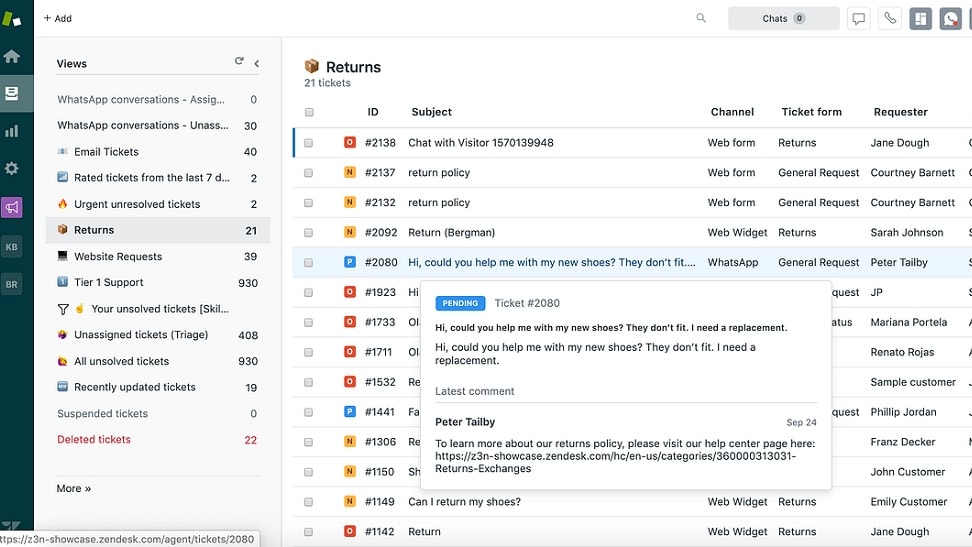
Zendesk's core feature, its ticketing system, is a standout in the world of customer support. It excels at consolidating support requests from multiple channels into structured tickets. These tickets are easily tracked, prioritized, and responded to by agents, promoting streamlined and efficient customer service. For example, a customer inquiry via email, chat, or social media can seamlessly transform into a well-organized ticket, ensuring nothing falls through the cracks.
Salesforce Service Cloud offers robust case management capabilities, but it lacks an explicit ticketing system as comprehensive and efficient as Zendesk's. While cases can be managed, Salesforce Service Cloud leans more towards a broader customer relationship management (CRM) approach, which may require additional configuration to match Zendesk's ticketing precision.
Zendesk Edges Out Salesforce Service Cloud in User-Friendliness

When it comes to ease-of-use, both Salesforce Service Cloud and Zendesk aim to deliver a seamless user experience. However, Zendesk takes a slight edge over Salesforce Service Cloud in this aspect. Zendesk's intuitive interface makes it remarkably user-friendly. For instance, its ticketing system is easy to navigate, and setting up automated workflows is straightforward.
Additionally, Zendesk offers customizable templates for knowledge base articles, simplifying the creation of helpful resources for customers. While Salesforce Service Cloud offers powerful capabilities, its interface can be more complex, requiring additional training for users to maximize its potential.
Zendesk Outshines Salesforce Service Cloud in Customization and Branding

Zendesk stands out with its exceptional customization and branding opportunities. Businesses can tailor the platform to precisely match their branding and design preferences. For instance, they can customize the appearance of the self-service portal, email notifications, and even embed support widgets seamlessly into their website. This level of customization ensures a consistent and visually appealing customer experience across all support interactions, reinforcing brand identity.
While Salesforce Service Cloud excels in versatility and offers a broad array of features, it does not provide the same explicit customization options for branding. While businesses can configure workflows and processes extensively, tailoring the user interface to align perfectly with branding may require more effort and development work.
Salesforce Service Cloud is Superior at Omni-Channel Routing Compared to Zendesk

Salesforce's Omni-Channel Routing feature is a game-changer in the realm of case management. It intelligently assigns work items to agents based on their skill set, availability, and capacity, guaranteeing the swift and efficient resolution of cases. For example, it can automatically direct a complex technical support ticket to an agent with the required expertise, reducing resolution time and enhancing customer satisfaction.
While Zendesk supports multiple communication channels for customer interactions, its routing functionality doesn't reach the same advanced level as Salesforce's. Salesforce takes it a step further by leveraging artificial intelligence (AI) to distribute work items effectively. This AI-driven routing can make decisions based on historical data, agent performance, and real-time conditions, optimizing the allocation of tasks.
Zendesk's Superior Integration Capabilities Outshine Salesforce Service Cloud

In the realm of integration possibilities, both Zendesk and Salesforce Service Cloud exhibit robust offerings. Nevertheless, Zendesk outshines Salesforce Service Cloud in this regard. Zendesk boasts an extensive library of pre-built integrations and apps that effortlessly connect with various third-party tools. For instance, Zendesk seamlessly integrates with popular communication channels like Slack and WhatsApp, allowing businesses to consolidate customer interactions efficiently. Moreover, Zendesk's open API framework facilitates custom integrations, ensuring adaptability to unique workflow requirements.
In contrast, while Salesforce Service Cloud offers solid integration options, it may require more configuration and customization to achieve the same level of versatility as Zendesk.
Salesforce Service Cloud and Zendesk are Competitive in Knowledge Management

Salesforce Service Cloud excels in Knowledge Management, empowering agents to swiftly access pertinent knowledge articles. This feature not only reduces the cognitive burden on support teams but also accelerates case resolution. For instance, agents can easily locate step-by-step troubleshooting guides, FAQs, or product documentation, streamlining customer support interactions.
Similarly, Zendesk offers a robust knowledge base that facilitates the creation and maintenance of articles, FAQs, and self-help resources. This empowers customers to independently discover solutions, lessening the dependency on agent assistance. Zendesk's knowledge base is customizable and user-friendly, making it a valuable tool for businesses looking to enhance customer self-service options.
Subscribe to our newsletters.
No FOMO here. Stay up-to-date on all the latest deals and news with our monthly newsletter straight to your inbox like 125,000+ entrepreneurs (+ Get 10% off on on our Premium Membership!)
Salesforce Service Cloud vs Zendesk: Which is the best for your business?
Salesforce Service Cloud is the best tool for you if:
- You need a comprehensive customer relationship management (CRM) solution, combining customer support, sales automation, and marketing capabilities in a single platform.
- Your business is of varying sizes, from startups to large enterprises, as it offers scalability and adaptability
- Extensive customization is crucial, allowing you to tailor workflows, processes, and user interfaces to your specific needs.
- Automation is a priority to streamline tasks and boost efficiency, reducing manual workloads.
- You require advanced reporting and analytics tools to gain valuable insights into customer interactions and service performance.
Zendesk is the best tool for you if:
- Your primary focus is on customer support, and you need a user-friendly platform for efficiently managing customer inquiries and ticketing processes.
- You are a small to medium-sized business seeking cost-effective and straightforward support solutions.
- Customization and branding options are essential to align the platform with your unique business identity and customer experience.
- You need a knowledge base system to enable customer self-help, FAQs, and resource access for quick issue resolution.
- Quick setup and ease of use are top priorities, particularly for businesses with limited IT resources and the need for rapid deployment.
6 months free on Zendesk
Get 6 months free on Zendesk and up to $50,000 savings with Secret.
Alternatives to Salesforce Service Cloud & Zendesk
Promotions on Customer Support software
Start saving on the best SaaS with Secret.
Secret has already helped tens of thousands of startups save millions on the best SaaS like Salesforce Service Cloud, Zendesk & many more. Join Secret now to buy software the smart way.


